by Heather Plett | Feb 16, 2018 | holding space
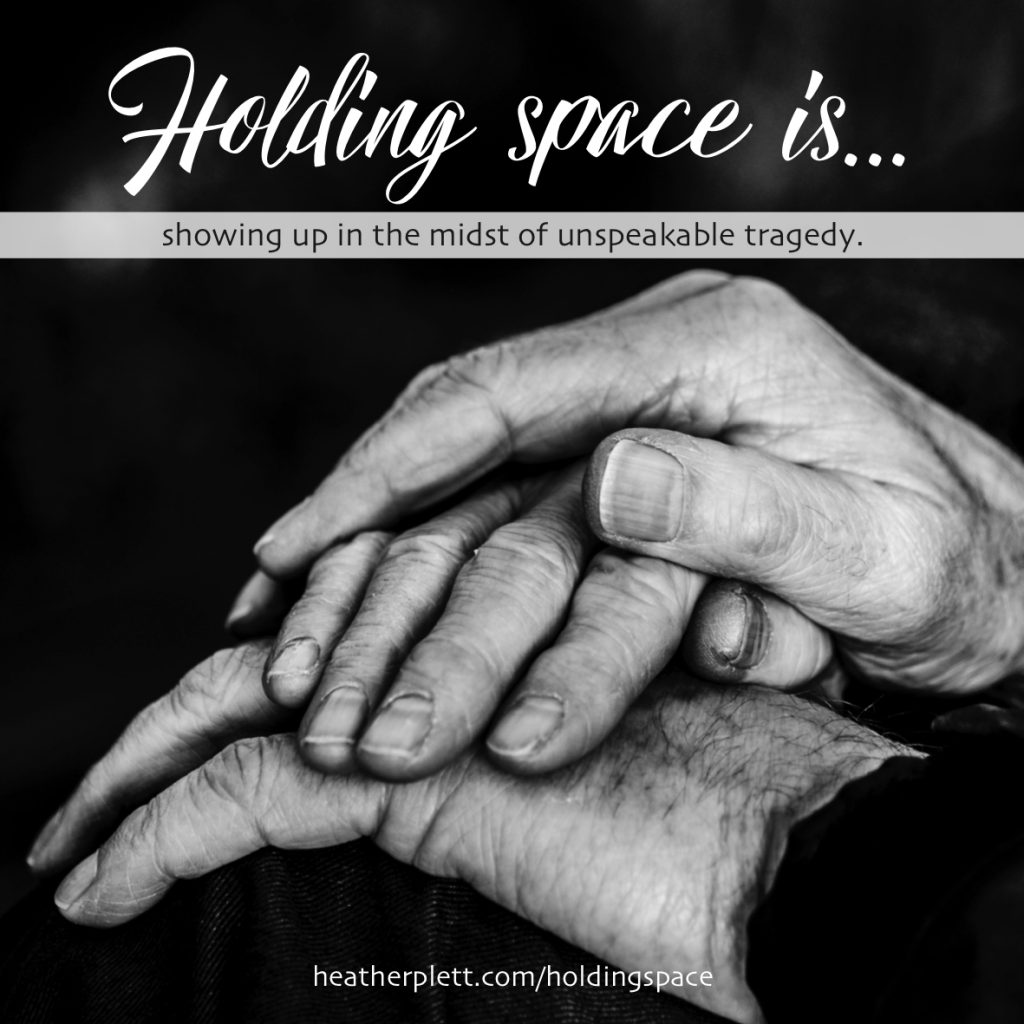
In May of 2017, I stood in front of a large group of therapists, school counsellors, and youth workers in Broward County, Florida, teaching a full day workshop on how to hold space for grief and trauma. The next day, I taught many of the same people in two smaller groups how to hold meaningful conversations using The Circle Way.
I almost didn’t make it to Florida. The border guard didn’t understand my work and considered turning me away for not having applied for the appropriate visa. “You’re teaching GREEK?” he asked. “No,” I said, “I’ll be talking about GRIEF.” He looked at me incredulously. Would someone really fly thousands of kilometres to talk about something so depressing? Before he finally approved my entry, he spent an hour deliberating with his supervisor in a back room.
This week, just a twenty minute drive from the auditorium where I taught, seventeen people were killed at Marjory Stoneman Douglas High School. Those very people I spent those two days with will be the ones called on to support youth, families, and community members through it. Some of them might have even been directly or indirectly impacted by the shooting. Either way, they will face what may be the hardest challenge of their lives – holding space for unspeakable tragedy in a community that no longer takes their children’s lives for granted.
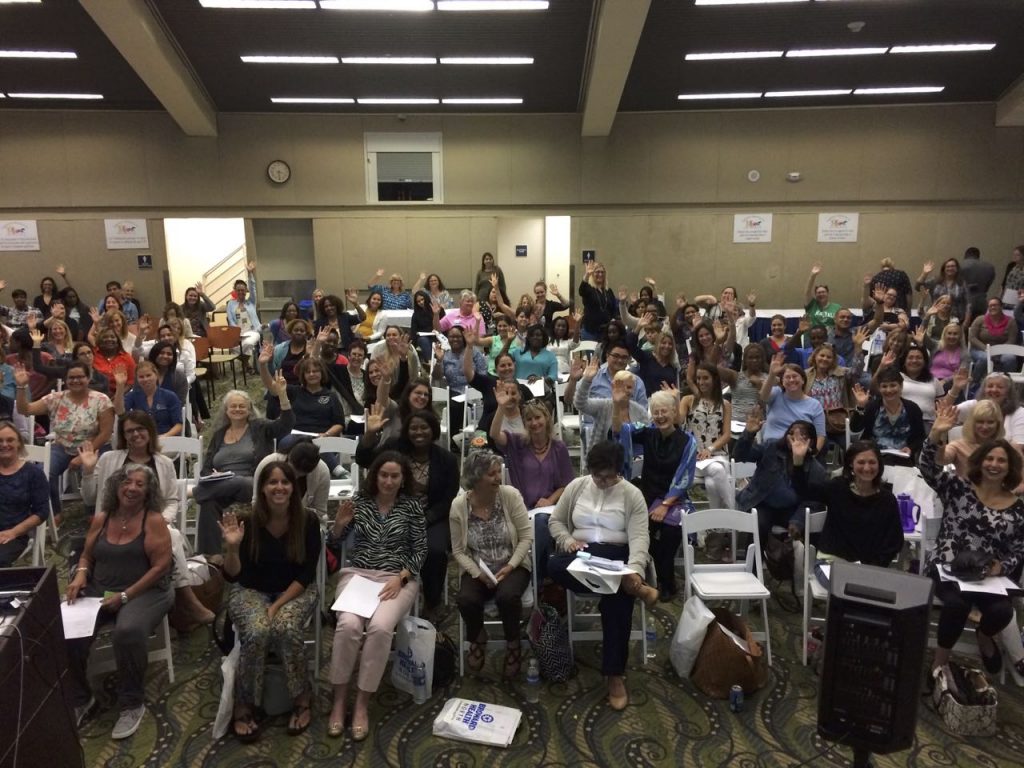
workshop participants in Florida
As I sat with that thought, and remembered my time with those beautiful, good-hearted people who spend their lives doing the kind of work that baffles border guards, I wrestled with what kind of support I could offer from so far away. I can’t reasonably stand by their sides or gather them into circles to hold space for their tears and anger. I can’t sit with them when they listen to the anguish of heartbroken high school students, or help them while they support the teachers who will have to carry on after so much loss.
About the only things I can offer them are my love, my encouragement, and my words, hoping against hope that something of meaning will land when they need it most.
This then, is my encouragement for them and for anyone else who finds themselves holding space for unspeakable tragedy. These are not meant to be “thou shalt” words of wisdom, but rather they are gentle whispers to remind you of what you likely intuitively already know.
- Unless they’re doing harm to themselves, don’t get in the way of the emotional release. Those impacted by such horrible tragedy, will need to weep, scream, and rage at the injustice of it all. Let them. None of those emotions are “bad” or “too much”. They need to be released rather than bottled up inside. A person who doesn’t have a healthy release – who’s made to feel guilty for feeling too much – will shut up those big feelings inside and find less healthy ways to release them later. Offer them a safe space to express what they need to.
- Remember that trauma is a physical thing as much as it is emotional. When we block the release of that trauma – by stopping the emotions or shutting down the physical shaking that may occur – it can get stuck in the body and the person may find themselves, years from now, struggling with the debilitating impact of PTSD, addiction, etc.. Help them find healthy somatic (body-centred) ways to release and process the trauma. That may be somatic therapy, and/or it may be more simply engaging youth in physical activities that get them out of their brains and into their bodies. It may also be engaging with alternative therapy programs like equine assisted therapy or art therapy. (Some suggestions: TRE, In an Unspoken Voice: How the Body Releases Trauma and Restores Goodness, by Peter A. Levine, The Body Keeps the Score: Brain, Mind, and Body in the Healing of Trauma, by Bessel Van Der Kolk, When the Body Says No: Exploring the Stress-Disease Connection, by Dr. Gabor Mate, EAGALA)
- Don’t expect them to make too many decisions. A person’s decision making capacity is impaired in the middle of grief and trauma, and even the simplest decisions (what groceries to buy in order to feed their families) can quickly overwhelm them. If you can, simplify things by giving them fewer options (ie. “I’m picking up supper for your family. Unless I hear otherwise from you, I’ll get pizza.”).
- Hold onto your advice or guidance until they ask for it or until you see clear evidence that they’ll be harmed if you don’t step in. When a person is completely overwhelmed by the situation, you may need to step in to give gentle guidance, but otherwise, this is not a time for much advice or guidance. Advice might even contribute to them feeling worse than they did before, because they’ll suddenly feel like they’re not “doing grief right”.
- Don’t try to make sense of it for them. Eventually, their resilience may be built up by meaning-making (ie. finding a purpose in their deceased loved one’s life), but that’s their journey and it will take a lot of time for them to get there. You can be a sounding board for them while they search for the meaning, but offering them that before they’re ready for it may sound like a callous dismissal of their huge loss. Grief first, meaning later. Once they’re ready for it, ask gentle questions that will help them find their own way through to meaning. Don’t prescribe your own meaning to it. (Recommended reading: Man’s Search for Meaning, by Viktor Frankl)
- Remember to care for the caregivers (teachers, principals, custodial staff, parents, community members, etc.) as well as those most directly impacted. While they may not have been directly impacted by the trauma, they might suffer vicarious trauma from having to support those who were. Show them your support in big and little ways (ie. hosting sharing circles, bringing food to their families, giving them days off for self-care, checking in with them weeks after the tragedy, etc.).
- “Comfort in, dump out.” As this wise article suggests, consider who is closest to the centre of the tragedy and make them the priority for care and comfort. Then extend outward, considering who is the next closest to the tragedy, and so on. Wherever you find yourself in the concentric circles, extend comfort inward (to those closer to the tragedy than you) and do your dumping (complaining, crying, raging, etc.) outward to those less affected than you.
- Be prepared for the long-term impacts of the tragedy. A year from now – two, three, ten years from now – this will still reverberate in the community and especially in the school. The children in that high school may still be suffering the effects in adulthood. Be patient and extend grace to people even long after others think they “should” be over it. Check in regularly and offer them a safe space to continue to process and heal. Don’t shame them for taking longer than other people have.
- Help them find rituals for healing and release. There’s a good reason why it is so common for us to gather at funerals after a person’s passing and to lay flowers on a grave years after the death. These are rituals that allow us to honour a person’s memory and express our love for them. Little by little, they heal us. Be creative and supportive in helping those affected to find the rituals that work best for them. It might be to frame their soccer jersey, to memorialize them with a park bench, to plant a tree for them in the backyard, or to throw a party for their closest friends. There is no “right” way to do this.
- Engage in radical self-care for yourself. The emotional labour required for holding space in such intense situations is much more taxing than we often realize. Be radical in how much compassion and care you extend to yourself. In the middle of the crisis, the best you might have time for is eating healthy food and drinking lots of water, but don’t forget to do more once there is more spaciousness. Set clear boundaries to protect the time you need for replenishment and healing. Take a day off work and go to the beach. Go for reiki or a massage. Hire a housecleaner to do the tasks you haven’t had time for. Do not feel guilt for the care you extend to yourself – it is essential. And forgive yourself whenever your imperfection shows.
This may be the hardest time in your life, and there are few words that will make it any easier. But remember that you are not alone. There is love and compassion being extended to you from thousands of miles away. Ask for the help you need and don’t try to do it all alone.
With love from Canada, your friend Heather Plett
******
Looking for more resources on holding space? I’ve gathered a collection here.
by Heather Plett | Feb 3, 2016 | grief, growth, journey, parenting
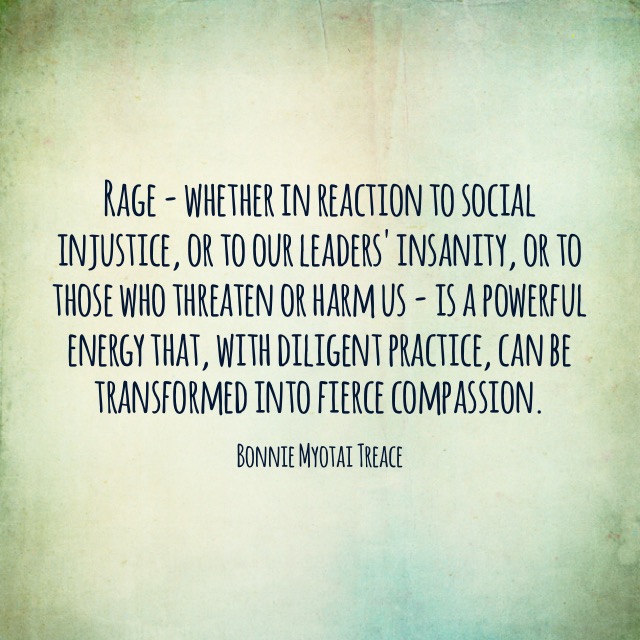
(Trigger warning) When I was just a little older than my oldest daughter, a man climbed through my bedroom window and violently took what didn’t belong to him – my virginity. I fought back, but he was stronger than I was and he held my own scissors over my head.
One of my memories from that hellish week was the shock on my dad’s face when he admitted that he – a lifelong pacifist – was suddenly aware that he was capable of murder.
Yesterday, I learned that the followers of a pro-rape misogynist pick-up artist are planning to meet this weekend in a mall near my home – a mall that my daughters frequent. Rage suddenly consumed me and I knew that I, like my father, could kill a man for hurting one of my girls.
Just after reading that article, I read another one by Melissa Harris-Perry in which she shares a story of a man threatening her in the lobby of a hotel. She froze, remembering her own rape and slipping into “the trance of survivor submission”. The only thing that jerked her back out of it and allowed her to fight back was the sudden awareness of her nearby students. Her students saved her, she said. She fought back because of them.
The combination of the two articles left me shaking and in tears. I was glad it was dark in the van as I left to pick up my daughter up at the pool. She didn’t know that my eyes were red – she only knew that she had finally succeeded in getting all the way through her synchronized swimming routine without faltering and she needed me to celebrate with her. And then, when a story came on the radio about Harry Potter, her passion for the half-blood magician filled the van and she chatted the rest of the way home. One of the things she told me was that Draco Malfoy was not a monster like everyone made him out to be, he was just misunderstood.
My daughters, like Melissa Harris-Perry’s students, save me again and again.
Later that evening, I was thinking about the many conversations I have had with a dear friend whose son, though he made some mistakes in his lack of understanding of girls, is not a monster. And yet now, because those girls painted him into a monster, he awaits the court’s decision about the seriousness of those mistakes.
And I realized that those young men who plan to meet in the mall to talk about how to pick up girls, are not monsters, they are somebody’s sons. And they make mistakes in their fumbling attempts to find affection. Perhaps they are the Draco Malfoys of their schools.
And suddenly, I don’t want to bring my rage to the mall, but rather my mother-love (and maybe milk and cookies). And I want to sit down with those young men, look them in the eyes, and say “how have you been so wronged by the world that you can only imagine getting what you want by taking someone else’s power away?” And then I want to offer them some tough love and tell them my story of how it feels to have a man treat you like that.
Sometimes it is rage that changes the course of the future, but more often, in my experience, it is love.
by Heather Plett | Nov 18, 2015 | Compassion, grief, growth, journey
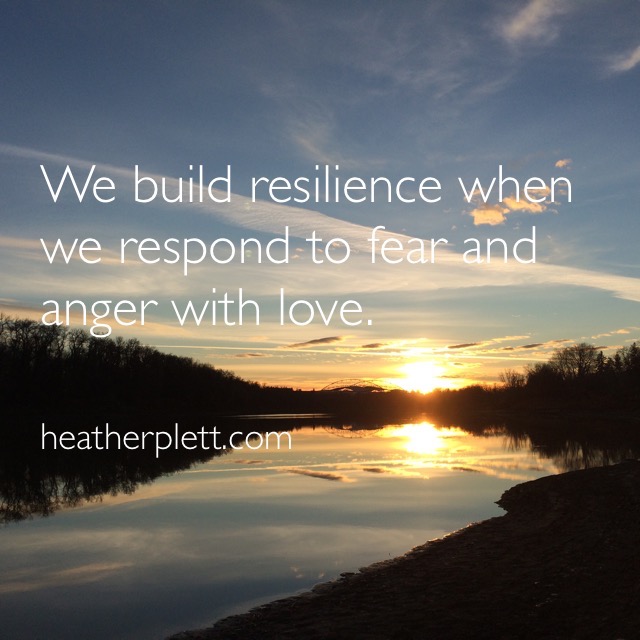
Yesterday, after dropping my daughter off at the pool, I went to a coffee shop to try to get some writing done. Unable to focus, though, I gave in to the distraction of social media, and when I did, I found myself getting more and more angry. I was angry at the terrorists who’ve torn apart so many people’s lives and instilled fear in so many more. And I was angry at the closed-minded people who are responding to the terrorism by becoming protectionist and prejudiced and not offering safe homes for the millions of refugees running away from the terrorists.
Because I was angry anyway, I started extending that anger to people closer to home – people in the coffee shop and people in my family whose actions were disappointing me at the time. Anger needs to feed itself, so it looks for more victims and more people to blame.
When I get angry (or fearful, or sad, or any of those intense emotions that sometimes feel scary and overwhelming), I’m tempted to shut down, to guard my heart and protect myself from further wounding. I’m tempted to pull away from people and become even more self-sufficient. And I’m tempted to find reasons to hate people and blame them for all of the ills of the world.
Last night, I checked out for awhile (Netflix is good for that), but this morning, I knew I needed to do something that would help me resist the temptation to shut down.
The only antidote I know for this kind of reaction in me is to dare to live with an open heart. It’s the hardest choice to make when I’m angry, but the more open my heart is, the less likely I am to let the anger and fear fester and get bigger.
The poet Mark Nepo tells us to be more like fish. “As fish must keep their gills open in order to survive moving through the water, humans must keep their hearts open in order to move through the difficult and wondrous river of experience. Letting life move through an open heart is how we make medicine out of our suffering.”
This morning I decided to be more like a fish.
I posted this on Facebook: “My heart’s been heavy this week, witnessing so much fear, hatred and closed-mindedness. So… let’s do something different. Tell me how you’ve seen love and openheartedness appear this week.”
The responses were simple and breathtaking. One shared about the friend who showed up to help her welcome her new dog. Another applauded her daughter who’d raised $1500 for a rescue mission that helps women get out of the sex trade. Another had seen an elderly white man help a young black boy tie his tie. Still others shared about kindhearted daycare workers, free clinics, supportive husbands, gracious sign-holders, and smiling grand-babies.
My heart started feeling a little bigger and the fresh air moved through my gills as I let the angry air out. I brought that feeling into my work, and was soon coaching clients who shared their vulnerable and brave stories of healing from past abuse and daring to step into their artist calling later in life. My heart grew healthier and stronger with each story that passed through me.
We build resilience when we respond to fear and anger with an open heart. We have to dare to be open to people’s stories and dare to be vulnerable with our own.
But there’s a harder part to this openhearted living that goes beyond being vulnerable with those people who feel safe, and that’s what I had to challenge myself with once the anger had subsided.
Living with an open heart also means daring to be compassionate with those who think differently from me and those who respond to their own fear and anger differently from me.
It wasn’t hard for me to extend compassion to my Facebook friends or coaching clients or even to the innocent Islamic people who are now facing prejudice and hatred because they are associated with the terrorists. Those people are safe and don’t require me to stretch too much. What I find to be much harder is to extend compassion to the terrorists themselves and to the people who are meeting hatred with hatred, spouting racist rhetoric and closing their doors to the Syrian people.
I had to dig deep to remember that these people are all responding to their own fears in the way that makes the most sense for them. Extending compassion does not mean that I need to agree with them or justify their actions, but it means that I have to dare to open my heart enough to see the hurt that turned them into the people they are.
Fear changes us. It makes us fierce in ways that sometimes surprise and even scare us.
When I was sexually assaulted a number of years ago, I went home to the farm to be with my parents. My pacifist, Mennonite dad, who would never allow a gun in the house and who never physically hurt anyone, admitted later that he was shocked by the realization that he was capable of killing another man. He’d never had that temptation before.
When people hurt or threaten people you love, or even if you simply perceive them to do so, it causes fear to rise up and you are suddenly not the rational, peace-loving person you always thought you were. Suddenly, you can think of only one thing – to keep your family safe at all costs. I get that, and I see it happening on a global scale in response to the terrorism we’ve witnessed. I also assume (though I can’t pretend to understand it) that it must be happening in the hearts of the terrorists. Something has made them so fearful and angry that the only response that makes sense to them is to destroy the people and the culture that pose the greatest threat.
There are so many players in this unfolding drama that I don’t understand, but when I remember how my dad was changed in that moment when he realized that someone had raped and tried to murder his daughter, it allows me to open my heart with some compassion to those who are responding out of their own deep wounds. Instead of opening their hearts and living like fish, they chose to close them and to allow the blackness to grow and consume them.
I wish those terrorists and those who are responding with hatred had all had fathers like mine. Perhaps they would have learned to make other choices.
My dad’s surprising rage was not the most memorable lesson of the day. The wisdom that I received from my dad came in the actions he chose just after learning that I’d been raped and nearly killed. After giving me a hug, and then leaving me to my mom’s nurturing arms, he went outside to feed the pigs. I wasn’t there when he fed them, so I don’t know whether he was crying or screaming or throwing things while he fed the pigs, I only know that he fed them. And, because I know my Dad, I expect he was also praying.
He fed the pigs because he needed some physical activity to dispel some of the rage. And he did it because he needed to do something useful and mundane in that moment when his world had been turned upside down. And he prayed because he knew he could only dispel the darkness in his own heart with the help of a Higher Power.
Once he was done, he came back inside with a calmer mind and a heart that dared to remain open. His God and his pigs helped him with that.
When the fear and rage and pain wash over you, it might feel impossible to remember what Mark Nepo said about living with your heart open to the world. Those are the times when you first need to feed the pigs. Or feed the children. Or go for a long walk in the woods. Or make art or music. Or dance. Or swing a hammer.
Do something to alchemize the pain, and then reach for a Higher Power who can help you change your heart. Once you’ve done those things, come back with a calmer mind and a heart that dares to remain open.
Lashing out in your pain will only create more pain and will never solve the problem. Only living with an open heart will allow you to move on without wounding anyone.
Interested in more articles like this? Add your name to my email list and you’ll receive a free ebook, A Path to Connection. I send out weekly newsletters and updates on my work.
by Heather Plett | Oct 4, 2012 | Beauty, beginnings, Community, Creativity, fearless, hope, journey, Leadership
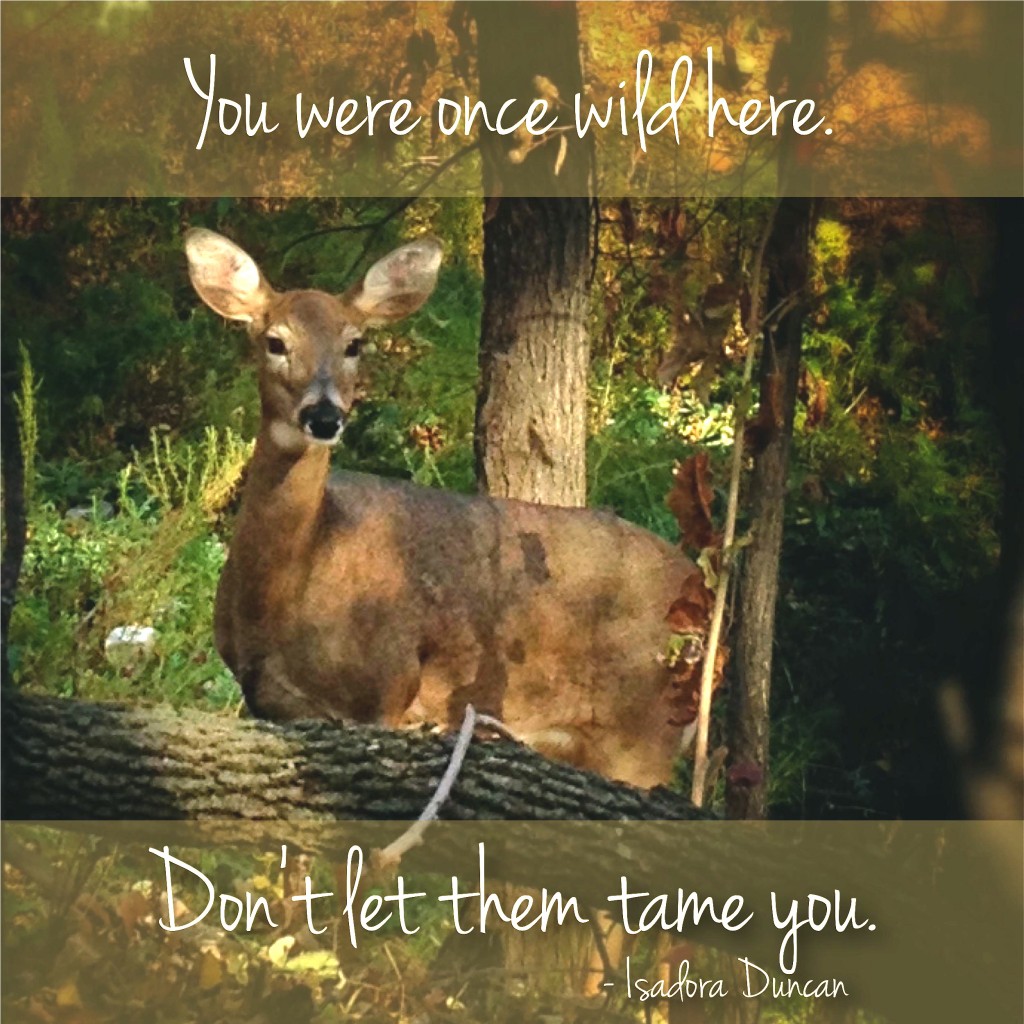 I have seen too many wounded women.
I have seen too many wounded women.
I have watched them lose the light in their eyes when the shadows overcame them.
I have heard a thousand reasons why they no longer give themselves permission to live truthfully.
I have seen too many wild hearts tamed.
I have witnessed the loss of courage when it’s just too hard to keep being an edgewalker in a world that values conformists.
I’ve recognized the fear as they take tiny brave steps, hoping and praying the direction is right.
“I feel guilty whenever I indulge in my passions. It feels selfish and irresponsible.”
“My husband doesn’t like it when I talk about feminine wisdom, so I keep it to myself.”
“If I write the things that are burning in my heart, it will freak people out. So I remain silent.”
“I used to love wandering in the woods, but I never have time for it anymore.”
“I just want to have a real conversation for a change. I want to feel safe to speak my heart.”
“My job makes me feel dead inside, but I don’t know what else I can do.”
“People expect me to be strong and hide my feelings now that I’m in leadership. I feel like I have too much bottled up inside that I can’t share with anyone.”
“Sometimes I think there must be something wrong with me. I just don’t fit in.”
“There is so much longing in the world. I get lost in that longing and don’t know how to sit with it.”
“I wanted to be a painter, but I needed a real career. I haven’t painted in years.”
“People think I’m strange when I share my ideas, so I’ve learned to keep them to myself.”
“I can’t go to church anymore. I don’t feel understood there. But I haven’t found another place where I can find community, so I often feel lonely.”
“There’s a restless energy inside me that wants to be free. I long to be free.”
So much woundedness has been laid tenderly on the ground at my feet.
So many women want their stories validated. Their fears held gently. Their tiny bits of courage honoured.
I hear them whisper “please hear me” through clenched teeth.
I see the tears threaten to overflow out of stoic eyes.
I recognize the longing.
I know the brokenness.
I feel the ache of silenced dreams.
They come to me because they know I have been broken too.
They trust me with their whispers because I am acquainted with fear.
They look to me for courage and understanding because they witness my own long and painful journey back to my wild heart.
I see you.
I know you.
I honour you.
I love you.
You are beautiful.
You are courageous.
You are okay.
You can be wild again.
You can trust your heart. She will not lie to you.
You can live more fully in your body. She will welcome you back.
You can go home to that part of you that feels like it’s been lost.
You can find a circle of people who will understand you.
You can step back into courage.
You have permission to be an edgewalker.
You have permission to speak the things that you’re longing to say.
You have permission to be truly yourself.
You have permission to step away from your responsibilities for awhile.
You have permission to wander in the woods.
You also have permission to be afraid.
And to wait for the right time.
And to sit quietly while you build up your courage.
You don’t need to do this all alone.
And you don’t need to do it all at once.
You don’t need to shout before you’re ready to whisper.
You don’t need to dance before you’ve tried simply swaying to the music.
You can give your woundedness time to heal.
Take a small step back into your self.
Move a little closer to your wild heart.
Pause and touch the wounded places in you.
Just breathe… slowly and deeply.
And when you’re ready, we can do this together.
If this post resonates, please consider the following:
1. Join me as I host a circle of amazing women at A Day Retreat for Women of Courage in Winnipeg on October 20th. Pay what you can.
2. I’m creating a new online program called Lead with Your Wild Heart (related to the themes in this post) that feels like a coming together of a thousand ideas that have filled my head in recent years. Add your name to my email list (top right) to be the first to hear about it and to receive a discount.
by Heather Plett | Sep 13, 2012 | Compassion
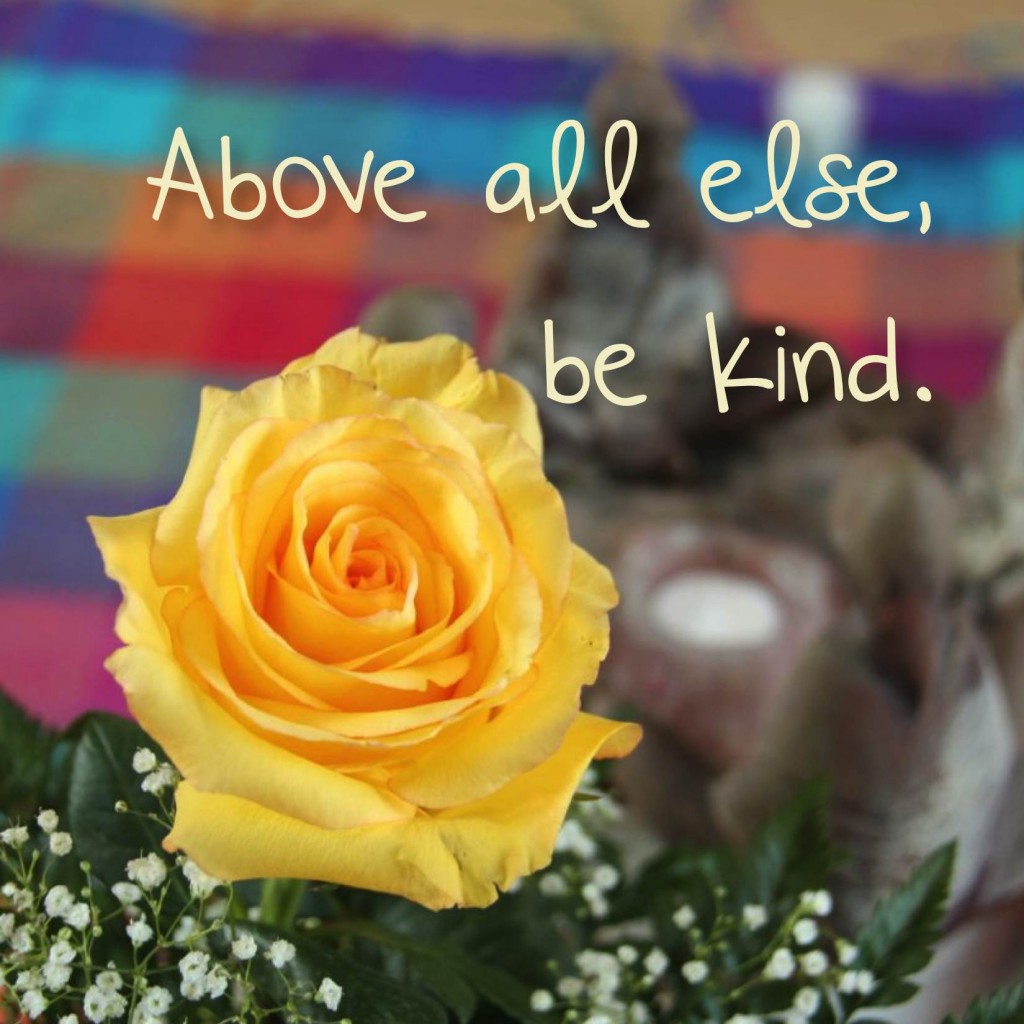
I have been the recipient of a great deal of compassion lately – openhearted, open-armed, soul-enriching compassion. I am deeply blessed.
It brings to mind the simple words my Dad used to say almost every time we left the house. “Be kind,” he said, and we knew that if we did nothing else but offer someone kindness that day, then we had been successful in Dad’s eyes.
There have been a LOT of successful people in my life lately.
Not only have I been comforted and encouraged by kindness, I have been educated by it. Here are my thoughts, based on what I’ve witnessed, about how to offer compassion to people you care about who are going through tough times.
1. Create safety. The most important thing you can do is offer the person a safe place to fall apart. Be trustworthy, be present, be available, and be soft. Give them the warmth of your touch, the comfort of your words, and the gift of your listening.
2. Refrain from offering advice until you know they’re strong enough to receive it (and/or they’ve asked for it). When a person is feeling vulnerable and broken, unsolicited advice can make them feel like they’ve failed or they’re not as good as you are at handling difficult times. Your advice may be valuable, but don’t offer it if it will make them feel small.
3. Withhold judgement. Nobody who’s going through a difficult journey wants to be judged for their weakness, their tears, their messy home, or their indecisiveness. Bite your tongue even if you think they’re being foolish or immature. Let them be weak if they need to be weak. There will be time for strength later.
4. Be an active listener. Let the person suffering do most of the talking and be fully present for what they are saying. In the middle of the struggle, there is nothing quite as powerful as knowing that you are heard and seen. Don’t try to fill the silences with platitudes or solutions. Leave as much space as they need to share their stories and work through what they need someone to hear.
5. Offer empathy, not sympathy. Empathy lets a person know they’re not alone, sympathy leaves them feeling inferior. Empathy builds bridges, sympathy builds walls. People who offer sympathy (eg. “poor you”) instead of empathy are usually doing it because they feel some need to elevate themselves above the other person.
6. Share your stories to make them feel less alone, but don’t overshadow their stories. Stories are really important in times of grief or stress, but the most important stories that need to be shared at that time are the ones that belong to the person going through the trouble. Offer your own stories in a respectable manner, but only after they’ve had a chance to share theirs.
7. Do not pretend to know EXACTLY what they’re going through. You can’t possibly know just what they’re experiencing because you are a different person carrying different baggage. You may have been on a similar path and felt similar pain (and that’s worth sharing), but each person’s path is his/her own. Let them describe what they’re going through rather than assuming you know.
8. Let them cry. Cry with them if that is what emerges. Don’t try to end their grief or fix their pain. Sit with them in the middle of that field of grief and just let what is be what it needs to be. Nobody can take a shortcut through pain, so don’t pretend you’ve found one. Watching a loved one cry feels excruciating, and you really, really want to fix it for them, but to show them the kind of love they need, you need to let the tears flow and simply bear witness.
9. Let them know that they are courageous, even if their courage only shows up in very small ways. When the road is hard, just putting one foot in front of another takes courage. Sometimes getting out of bed in the morning takes courage. Help them discover their own basketful of courage stories – memories of the times when they have shown courage that will help them rise to the challenges ahead.
10. Just love them. Plain and simple. Bring them supper, buy them chai latte, babysit their kids, take them out to a movie, show up to help them serve the food at the funeral they’ve been dreading, sit with them at the hospital, buy them toilet paper when you’re sure they haven’t had a moment to go shopping, drop love notes in their mailbox… do whatever it takes to let them know they are surrounded by love.






